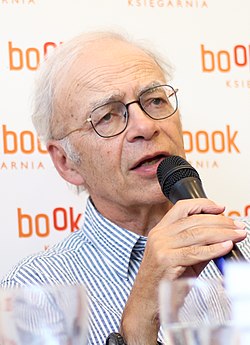Peter Singer Quote
In fact, the Nazis did not have a euthanasia program, in the proper sense of the word. Their so-called euthanasia program was not motivated by concern for the suffering of those killed. If it had been, they would not have kept their operations secret, deceived relatives about the cause of death of those killed, or exempted from the program certain privileged classes, such as veterans of the armed services or relatives of the euthanasia staff. Nazi ‘euthanasia’ was never voluntary and often was involuntary rather than nonvoluntary. ‘Doing away with useless mouths’ – a phrase used by those in charge – gives a better idea of the objectives of the program than ‘mercy-killing’. Both racial origin and ability to work were among the factors considered in the selection of patients to be killed. It was the Nazi belief in the importance of maintaining a pure Aryan Volk – a quasi-mystical racist concept that was thought of as more important than mere individuals’ lives – that made both the so-called euthanasia program and later the entire holocaust possible. Proposals for the legalization of euthanasia, on the other hand, are based on respect for autonomy and the goal of avoiding pointless suffering.
In fact, the Nazis did not have a euthanasia program, in the proper sense of the word. Their so-called euthanasia program was not motivated by concern for the suffering of those killed. If it had been, they would not have kept their operations secret, deceived relatives about the cause of death of those killed, or exempted from the program certain privileged classes, such as veterans of the armed services or relatives of the euthanasia staff. Nazi ‘euthanasia’ was never voluntary and often was involuntary rather than nonvoluntary. ‘Doing away with useless mouths’ – a phrase used by those in charge – gives a better idea of the objectives of the program than ‘mercy-killing’. Both racial origin and ability to work were among the factors considered in the selection of patients to be killed. It was the Nazi belief in the importance of maintaining a pure Aryan Volk – a quasi-mystical racist concept that was thought of as more important than mere individuals’ lives – that made both the so-called euthanasia program and later the entire holocaust possible. Proposals for the legalization of euthanasia, on the other hand, are based on respect for autonomy and the goal of avoiding pointless suffering.
Related Quotes
As a minister of the Lord in whatever way the Lord decides to use you and with the gifts he gives you for the work, there is the tendency to start idolizing the work itself or the gifts that you forge...
About Peter Singer
On two occasions, Singer served as chair of the philosophy department at Monash University, where he founded its Centre for Human Bioethics. In 1996, he stood unsuccessfully as a Greens candidate for the Australian Senate. In 2004, Singer was recognised as the Australian Humanist of the Year by the Council of Australian Humanist Societies. In 2005, The Sydney Morning Herald placed him among Australia's ten most influential public intellectuals. Singer is a cofounder of Animals Australia and the founder of the non-profit organization The Life You Can Save.
